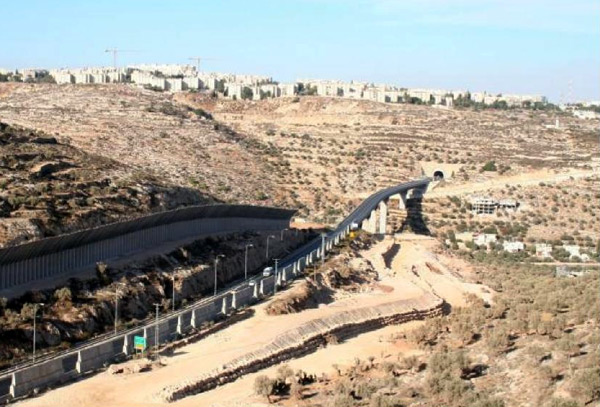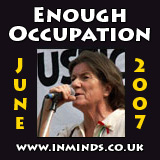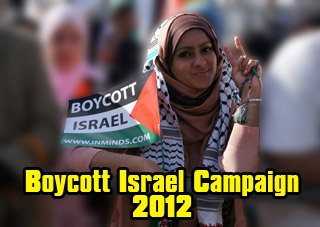
 Innovative Minds © 2014. All Rights Reserved. www.inminds.co.uk | |||||||||||||
US funds apartheid road network in IsraelJonathan Cook, The National The construction of sections of a controversial segregated road network in the West Bank planned by Israel for Palestinians – leaving the main roads for exclusive use by settlers – is being financed by a US government aid agency, a map prepared by Palestinian researchers has revealed. USAid, which funds development projects in Palestinian areas, is reported to have helped to build 114km of Israeli-proposed roads, despite a pledge from Washington six years ago that it would not assist in implementing what has been widely described by human rights groups and the Israeli media as Israel’s “apartheid road” plan. To date the agency has paid for the construction of nearly a quarter of the segregated road network put forward by Israel in 2004, said the Applied Research Institute of Jerusalem (ARIJ). The roads are designed to provide alternative routes to connect Palestinian communities, often by upgrading circuitious dirt tracks or by building tunnels under existing routes.  USAID funded 'Jews only' settler road near the West Bank town of Beit Jala south of Bethlehem. Meanwhile, according to human rights groups, Israel has reserved an increasing number of main roads in the West Bank for Israelis so that Jewish settlers can drive more easily and quickly into Israel, making their illegal communities more attractive places to live. The US agency’s involvement in building a segregated West Bank road infrastructure would run counter to Washington’s oft-stated goal, including as it launched “proximity talks” last week, to establish a viable Palestinian state with territorial contiguity. “The displacement of Palestinians from the West Bank’s main roads improves the appeal of the settlements by better integrating them into Israel,” said Suheil Khalilieh, the head of settlement monitoring at ARIJ. “Conversely, creating an inferior, alternative network of local roads makes travel between the main regions of the West Bank difficult and time-consuming for Palestinians.” Israel proposed the creation of two separate road systems in 2004, after many of the West Bank’s main roads had been sealed off to Palestinians following the outbreak of the second intifada. Ariel Sharon, the then-prime minister, argued that segregated infrastructure would create “contiguity of transportation” for Palestinians and help to alleviate economic hardship resulting from hundreds of roadblocks and checkpoints that restrict Palestinian movement. The international community was asked to finance 500km of roads for the Palestinians, later termed “fabric of life” roads, including upgrading agricultural tracks and constructing many underpasses and bridges, at a cost of US$200 million (Dh730m). The Palestinian Authority, however, objected, saying the plan would further entrench the illegal settlements in the West Bank and justify confiscating yet more Palestinian land for the new roads. That position was backed by international donors, including the US, which declared it would not finance any road projects against the PA’s will. Despite the US promise, however, a map of the West Bank recently published by ARIJ shows that 23 per cent of the “alternative” road network Israel proposed has been built with USAid money. Many of these roads are located in so-called Areas B and C, more than 80 per cent of the West Bank that was assigned to Israeli security control by the Oslo accords. Israel oversees all road projects in these areas. Mr Khalilieh said the PA was being effectively bullied into conceding the road infrastructure wanted by Israel. “What happens is that USAid presents a package deal of donations for infrastructure projects in the West Bank and the Palestinians are faced with a choice of take it or leave it. That way the PA is cornered into accepting roads it does not want.” He said some roads were also being approved because of a lack of oversight by the PA. An inter-ministerial committee to vet proposed roads to ensure they did not contribute to the Israeli plan had been inactive since 2006, he said, following the split between Fatah and Hamas in the Palestinian elections. After PA officials were presented with ARIJ’s map, Salam Fayyad, the Palestinian prime minister, issued a statement last weekend denying that the PA had contributed to the Israeli-proposed road network. However, in a sign that such reassurances were unlikely to dampen concerns, he reconvened the inter-ministerial committee to conduct field vists to check on road projects that had been carried out or were in progress. Ghassan Khatib, a Palestinian government spokesman and a former planning minister, said the PA was taking the issue “very seriously” and was doing everything possible to resist the emergence of an “apartheid system” in the West Bank. He added that, if roads were being built that served the settlers’ interests, “that is not supposed to happen”. According to USAid’s figures, it has financed 235km of roads in the West Bank in the past decade, and is preparing to add another 120km by the end of this year. Critics add that in some cases the upgrading by USAid of minor roads, even those not included in the Israeli plan, has worked to the same end of keeping Palestinians off the West Bank’s main highways. USAid officials were unavailable for comment. Among roads for Palestinians funded by USAid are several projects south of Bethlehem that appear to be providing an “alternative” to Road 60, a busy highway that has traditionally linked Jerusalem with the Palestinian cities of Bethlehem and Hebron in the southern West Bank. Israel has increasingly restricted Palestinian access to Road 60 because it also serves as a fast direct route for Jewish settlers in the Gush Etzion bloc driving to and from Jerusalem. As a result, residents of several nearby Palestinian villages, including Batir, Wadi Fukin, al Walaja and Husan, have been forced off Road 60 and on to USAid-funded side roads and underpasses to connect them to Bethlehem and other neighbouring communities. Sarit Michaeli, a spokeswoman for B’Tselem, an Israeli human rights group, said 170km of roads in the West Bank were either off-limits to Palestinians or highly restricted, creating what the organisation has called “forbidden roads”. The organisation noted that, after the 2004 scheme for complete separation was rejected by donors, Israel adapted the plan, using bridges, tunnels and interchanges to create partial separation, with the Israelis “traveling on the fast upper levels, and Palestinians on the lower levels”. It concluded: “The plan allows Palestinian vehicles to travel on only 20 per cent of the [West Bank] roads on which Israeli vehicles travel.” Ms Michaeli added that the growing dependence of Palestinian traffic on underpasses meant that Israel was in a position to control or even sever connections between Palestinian areas with only one military jeep. Ingrid Jaradat Gassner, the director of Badil, a Bethlehem-based organisation that has lobbied against road segregation in the southern West Bank, said there was considerable domestic and international pressure on the PA to agree to roads dictated by Israel, if only because they often eased the existing restrictions on Palestinian movement. “Sadly, the PA is helping to build its own Bantustans,” she said. “Palestinian towns and villages connected by back roads and tunnels while the settlers control the main highways is what the US appears to mean when it talks about a viable Palestinian state.” Source: http://www.thenational.ae/apps/pbcs.dll/article?AID=/20100515/FOREIGN/705149873&SearchID=73391078584244 Related ArticlesAlso Of InterestPage URL: http://inminds.com/article.php?id=10391
|
|
Support Us
If you agree with our work then please support us.Campaigns INMINDS Facebook Live Feed Latest Video's
INMINDS Twitter Feed Tweets by @InmindsComFeatured Video's
You need Flash player 8+ and JavaScript enabled to view this video.
[all videos (over 200)..] Featured MP3 Podcast  "I am sick of being accused of anti-Semitism when what I am doing is criticising Israel and the state of Israel." House of Lords Enough Occupation Rally, June 2007 [3min / 1Mb] [all podcasts..] Newsletter Feedback |
 |
 |





















































